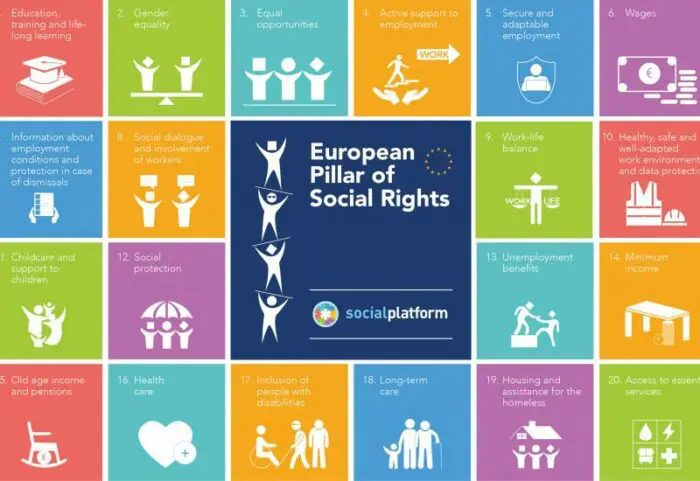| On 15th November, the European Association of Service providers for Persons with Disabilities(EASPD), publishes its position paper on the EU Care Strategy that will be proposed in 2022 by the European Commission. For EASPD, the EU Care Strategy should propose a 21st century vision for “care”, based on principles of empowerment and active citizenship for people with support needs of all ages. It should offer guidance to Member States on how to put this vision of care in practice, as well as propose EU solutions to support Member States in their efforts. Earlier this year, European Commission President Ursula von der Leyen announced the Commission’s intention to launch an EU Care Strategy in 2022, with the “aim to support men and women in finding the best care and the best work-life balance for them”. Today, the European Association of Service providers for Persons with Disabilities (EASPD) publishes its position paper on the EU Care Strategy. EASPD’s stance brings in the perspective of over 20.000 organisations active in the field of disability, most of whom provide care and support for persons with disabilities across 41 countries. It is based on this knowledge and experience that we base our proposals. EASPD understands that the role of this EU Care Strategy is primarily to support, facilitate and coordinate action at national level towards ensuring that people get access to the care they need. For EASPD, this starts with defining a European vision of care. In other words: what is the role of “care” in 2021 and for the next decade? For EASPD, the debate around care has shifted from considerations such as “how can care protect and keep healthy” towards discussions around “how can care help people to enjoy their rights on an equal basis to others”. It goes beyond services that enable people to be healthy – at least in the traditional sense – and towards services that empower and enable all people to live the lives they want, where they want and with whom they want. For Jim Crowe, President of EASPD, “this modern vision of care requires a transformation as to how care is organised. It requires different types of services. Similar to how society is moving away from fossil fuels, society should move away from large, segregating institutional care towards a range of home and community-based services. The EU Care Strategy must be clear in this regard and promote the empowering forms of care that people want and need”. Supporting such a shift also requires identifying solutions to many of the social care and support sectors challenges: securing the transition to home and community services in practice, responding to the increase and shift in demand, maximising the sector’s triple job creation potential, reducing the funding gap, ensuring the system’s financial sustainability, managing the digital and green transitions and, of course, guaranteeing the quality of care. EASPD’s position paper proposes guidance to EU policy-makers on each of these points and more. For Maya Doneva, Secretary General of EASPD, “Much of social care around Europe is in crisis. COVID-19 has been damaging but more chronic issues are at stake. It is largely underfunded. It is understaffed. Upskilling opportunities are too limited. Outdated infrastructure is still predominant. We are yet to make the most of the digital and green transitions. And discussions around quality focus too often on the wrong indicators instead of focusing on quality of life. Yet, there are clear solutions to all these problems. We know what works. All that is missing is the political will to put them in practice. The EU Care Strategy has a crucial role to play to support Member States in these areas.” The European Union have many competences that can help Member States in implementing the EU Care Strategy. On top of setting out a vision of care and identifying solutions to its challenges, EASPD believes the EU Care Strategy should also set-out clear actions the EU, including the European Commission, can take in areas such as data collection, technical guidance, policy reforms and funds. For instance, guidance is needed on long-term care and de-institutionalisation, setting new ambitious targets for children’s access to childcare and early childhood intervention services, streamlining disability and ageing initiatives, promoting social dialogue in social services, acknowledging the important role of not-for-profit organisations in social care provision, better considering the quality of social investment in EU fiscal and economic policies, making the most of public procurement and state aid and more. Thomas Bignal, Head of Policy at EASPD, says “It is important to not over estimate or under estimate the impact an EU Care Strategy can have. Let’s be ambitious and set-out clear European initiatives that can help public authorities and social care providers implement the EU Care Strategy’s vision in our local communities. Each initiative – political, legal, financial, peer-learning & others – needs to demonstrate how it will contribute to the quality of life of those who draw from care services directly, for the millions of workers, as well as the informal support networks. Let’s also not forget that most people affected by this Strategy will be women. If successful, the EU Care Strategy will be an important gamechanger in making the European social welfare models better adapted to 21st Century social and economic needs across Europe”. With this position paper, EASPD will engage with European policy-makers to ensure the EU Care Strategy makes a difference to improving the impact of disability services across Europe, with the consequences that this will have for the millions drawing on care, working in care and providing informal care. |
For more information, please contact: Thomas Bignal,Head of Policy; thomas.bignal@easpd.eu; +32 2 233 77 23







